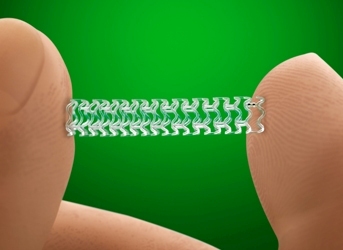First absorb heart stent implantation in Azerbaijan

By Nigar Orujova
A hospital in Azerbaijan has carried out a first unique absorbable heart stent implantation surgery on Thursday, the Health Ministry said.
Surgeons at the State Diagnostics and Treatment Center implanted it to the artery of a patient suffering from coronary artery disease. The operation was conducted by invasive cardiologist Shahin Khalilov under the guidance of cardiac surgeon Rashad Mahmudov.
The absorb heart stent, made by Abbott Laboratories, was designed to dissolve in a year after placement to restore the artery's natural flexibility.
The Health Ministry also said that the method is particularly effective for a young organism.
According to chemist Robert Rister, a stent is a flexible tube inserted into an artery to keep it open. Until recently, all heart stents were made of metal mesh. However, there were a number of problems with the inflexible, metal stents, which are foreign objects and may cause clotting or white blood cells accumulation. Moreover, since the stent is a mesh, scar tissue in the stent makes it impossible to remove and replace.
The soluble Absorb heart stent was designed to avoid these problems. Dissolving into the wall of the artery, it is much less likely to cause clotting. And since it disappears in the year after it is implanted, it does not trigger the growth of scar tissue or activate the immune system.
Abbott's bioresorbable vascular scaffold (BVS) was made from the corn-based plastic which is more common in fast-moving items such as biodegradable food packaging and even toys and sky boots.
Dr. Richard Rapoza, the chemical engineer in charge of developing the BVS, says that "as water comes in and reacts with the structure, it starts clipping the polymeric chains into smaller and smaller pieces." After about fifteen to eighteen months, all of the clippings are absorbed.
The European Union approved the Absorb stent in January 2011, after encouraging initial results of studies in the Netherlands. About 7 percent of patients implanted with the stent suffered adverse events, including heart attacks, but this is much better than the results of implanting metal stents.
Abbott reports that the results of their clinical trials thus far have been promising, and the devices should be on the market by 2015.
